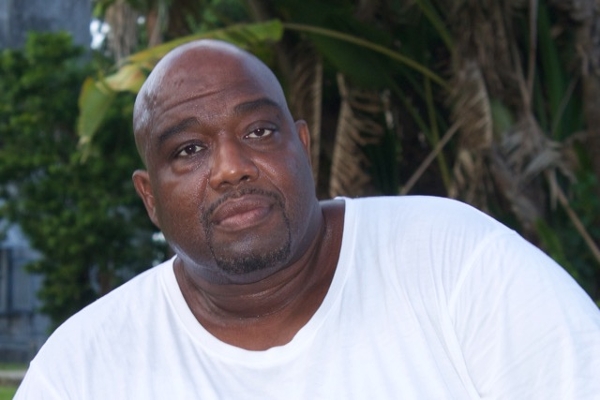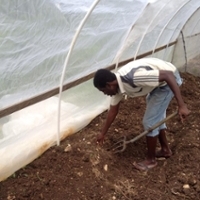
An Unexpected Career
How does an industrial engineer with extensive experience in information technology end up leading an NGO focused on community-based agricultural projects in the Caribbean? “It’s an interesting story,” says Johnson Shoyama Graduate School (JSGS) alumnus Phillip Lashley. During a Skype interview from his Barbados home, he reflects on how his time at JSGS is impacting his current, somewhat unexpected career.
By Bev Fast, Saskatoon-based freelance writer“When I started my career, I knew I would be involved in development in some way, but I always thought it would be through engineering and IT. I never expected it to be through agriculture. That’s one of the things you learn in the Master of Public Policy program—be open to different ways of influencing development.”
An Engineer by Training
In the first half of the 1990s, Phillip earned a BSc in Industrial Engineering from the University of the West Indies (UWI) in Trinidad, followed by a Master of Applied Science in Engineering from Dalhousie University in Halifax, Nova Scotia, where he travelled as a Commonwealth Scholar. He spent the next ten years building an IT-focused career, progressing from an operations manager to a private consultant and finally to IT manager of the government-owned Barbados Transport Board.
“Beginning from a very low level of automation, I was responsible for strategic management of the Board’s IT infrastructure. I managed implementation of IT components of the electronic ticketing system, installation of CCTV on fleet vehicles, a virtual private network system that connected depots across the island. I also developed the disaster preparedness plan and other policy documents, and I was a member of the interdepartmental government committee tasked with implementing an electronic, biometric-based national identification card.”
Somewhere along the way, he had time to earn a postgraduate diploma in eGovernment from UWI. Finding himself more and more involved in policy development outside his IT engineering background, he decided to expand both his horizons and opportunities.
“I was looking at public policy programs at three graduate schools, one at Harvard, one in Ottawa and JSGS in Saskatoon. In the end, it was the staff in admissions at JSGS who facilitated the application process and made everything such a breeze that made the difference in my choice,” Phillip says.
Supported by a scholarship from the Organisation of American States, Phillip arrived in Saskatoon on the morning of September 16, 2011. That night, he was sitting in his first class. Given his prior experience at Dalhousie, he had a fair idea of what to expect, both in class and in his new home. “I’d experienced winter before so I thought I was ready, but this was cold on a different scale,” Phillip says. “To be honest, I miss it sometimes … just sometimes.”
Gaining a Broader Perspective
Early on, Phillip met Rose Olfert, a professor [now emerita] with extensive experience in regional economics, rural development and the role of public policy in regional/rural restructuring and growth. “I was talking with Rose about what I could do for my research. I thought her work was interesting because it seemed to parallel some of the issues you see in small, developing island states in the Caribbean. I ended up working with her on First Nation’s economic development, a completely new area for me,”
The research not only formed the core of Phillip’s thesis, it led to the publication of a paper in the Journal of Aboriginal Economic Development: Off-Reserve Employment Options for Reserve Populations in Canada, by Phillip Lashley and M. Rose Olfert.
“I can’t say enough about Rose—her openness, giving me the opportunity to co-publish, going over and over my thesis presentation before my defense,” Phillip says.
Olfert also arranged for office space in the Agriculture Building on the University of Saskatchewan campus, and it was here that a seed was planted. “Being there five or six days a week, you start to notice all the conferences, and a lot of them seemed to focus on food security. I began to participate. At one conference I talked with a Trinidadian professor from McGill University about his work, and something he said stuck with me: you can’t change everything all at once, so pick something and get started.”
Soon after his convocation in 2013, Phillip put this advice into action.
Policy at a Grassroots Level
 “Three days after I returned home, a friend introduced me to a colleague who worked in finance and had an interest in agriculture. That led to the formation of the Caribbean Centre for Food Security and Sustainability (CCFSS).”
“Three days after I returned home, a friend introduced me to a colleague who worked in finance and had an interest in agriculture. That led to the formation of the Caribbean Centre for Food Security and Sustainability (CCFSS).”
By November the CCFSS was a registered NGO; by December the first pilot project was in the works—community organic greenhouses. The pilot is developing a set of turn-key resources and a replicable methodology for introducing organic agriculture to unemployed youth, women and retirees in communities across the island. Participants are trained in the principles of organic farming and greenhouse technology as a way to supplement income and improve community access to nutritious whole foods.
“Our objective is to build entrepreneurs,” Phillip says. “We train people in basic business skills: conflict resolution, marketing, bookkeeping, social media and community-based cooperatives. It’s a grassroots approach, but if you can change things at the grassroots level, then you can get other projects in other communities going.”
CCFSS is still a small shop—in addition to Phillip, there are two partners and an administrative assistant to round out complementing skill sets. One partner returned to Barbados to consult in forensic accounting after 10 years in financial services with Moody’s in New York; the other is currently completing a PhD in cultural industries and development policy.
Phillip is using skills honed at JSGS as well as in his previous IT/engineering career to move CCFSS forward. He and his team have been forging relationships with the Barbados Ministry of Agriculture, the Inter-American Institute for Cooperation on Agriculture (IICA) and other NGOs. He’s been working with funders, including the United Nations Development Programme (UNDP), and with local experts in farming and community activity.
“As I’ve learned more about the issues, I’ve begun to have more of a voice,” Phillip says. “The next step is to get involved in agriculture at the policy level.”

